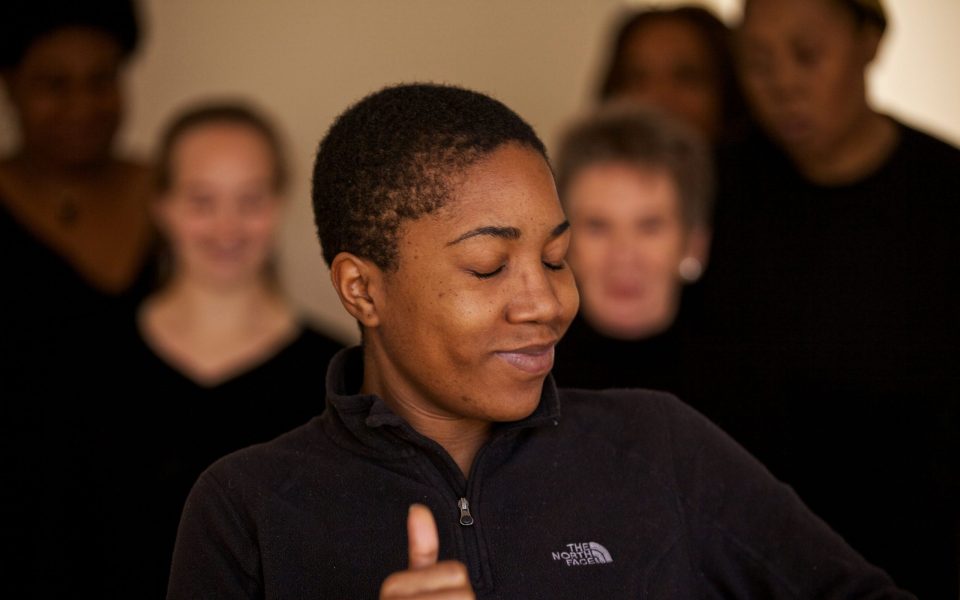by Anthony Harrison
Actresses dressed in black danced against the wide windows and stark white paint of director Suzana McCalley’s Winston-Salem living room, practically empty, save for the women, Ben Singer and his dirge-y Wurlitzer keyboard and the energy created by all.
Winston-Salem Mayor Allen Joines broke the vibe when he came in to check on the rehearsal.
Attentions shifted.
“Winston-Salem’s slogan is ‘City of Arts and Innovation,’” Joines stated. “To live up to that mantra, we have to make some of that happen.”
McCalley’s well connected — she’s the mayor’s girlfriend.
It’s a good connection. McCalley is savvy about funding for the arts, and Joines can incorporate evocative words like “mantra” into his daily vocabulary.
McCalley and her cast have bravely risen to the adversity of producing McCalley’s original play, A Goddess Tale.
Sponsored by the North Carolina Black Repertory Co. and supported with a $500 grant from the Arts Council of Winston-Salem, the play shows how a group of women living in a surreal commune depend on one another and their experiences to fully realize their energetic potential and become goddesses. They harvest their own stories — myths of loss, surrender and transformation — in an attempt to enlighten the world.
Each of the seven women are driven by the seven chakras of Hindu tradition, demonstrating how the Goddess Home is blocked or undeveloped.
“As a healing arts practitioner, I feel it’s important both disciplines [of therapy and performance] play together,” McCalley said.
McCalley, also co-owner of the Breathing Room in Winston-Salem, worked on the concept of A Goddess Tale for a few years, writing the stories and music in January while vacationing in the Bahamas.
While McCalley had penned shorter plays before, A Goddess Tale represents her first full-length production.
As a new show, the play has developed continuously since the first reading.
“The play’s constantly going through evolutions,” Willette Thompson, playing Omni, said. “You learn your lines, and three days later, you have new words and blocking. You almost have to start from scratch.”
However, carving out each individual role has rewarded each actress.
“I find my role fitting with my personal life,” Kismet Loftin-Bell, playing Lana, said. “The way I deal with relationships and conflicts is very similar to the way my character does.”
“We are all — almost spookily — we’re all our characters,” Thompson said.
The first off-script run-through emphasized the immediate connection between the women and their roles.
Soon after Joines’ cologne wafted out the front door, rehearsal began with encouraging words from McCalley.
“Just try to stay in it without breaking momentum,” McCalley told her cast. “This is your opportunity to run through and get the feeling of the play for the first time.”
After a few deep breaths and some humming “Ohm” the women all stood off the floor and instantly jumped into the play.
Each actress confidently embodied her individual goddess roles, portraying the characterizing chakras clearly and humorously, without a heavy hand — the sign of both good acting and effective writing.
Still, nerves ran high. Along the way, there were some hiccups: dropped lines, skipped lines, missing the opening pitch during songs.
But the vision and the concept remained intact; the energy flow was largely unblocked.
As the stories unfolded, the universe of the play shifted subtly between the reality of the Goddess Home and the historical fantasy of each goddess’ myth. The first story featured Lana — founder of the Goddess Home, representing the Feet Chakra and Mother Earth — reciting a creation myth, fittingly enough. As Lana turned into a narrator, the six other women became actors in the story within the show, helping to tell Lana’s tale with movement, dance and song.
While the chakra concept does make each character archetypal, it does so easily. The myths are all themselves rather conventional as well, but McCalley’s writing and imagery takes the traditional and makes it seem fresh. And the songs, while simple, are all soulful, catchy show tunes despite their simplicity, performed by bassist Billie Feather, drummer Lauren Myers and Singer — the only man on stage.
Already, the play’s sprouted wings for the future. Following its premiere on Thursday, A Goddess Tale will be read during the North Carolina Black Theatre Festival in August, and McCalley hopes to sell the rights to perform it elsewhere.
“I love when a play is not only original, but also invites invention and new approaches,” dramaturg Nathan Ross Freeman said. “[A Goddess Tale] is the kind of play that’s organically created and devised, and it invites organic growth with innovation and improvisation from each ensemble.”
While touting an all-female cast, A Goddess Tale entertains and remains instantly relatable and approachable.
“The play is called A Goddess Tale, but it shows various characteristics and attitudes we all go through, how they ebb and flow and how we’re interconnected,” Loftin-Bell said. “Young, old, male and female can get something out of the play.”
A Goddess Tale premieres on Thursday, running this weekend only, at Hanesbrands Theatre in Winston-Salem. For tickets, show times and more information, visit rhodesartscenter.org.
Join the First Amendment Society, a membership that goes directly to funding TCB‘s newsroom.
We believe that reporting can save the world.
The TCB First Amendment Society recognizes the vital role of a free, unfettered press with a bundling of local experiences designed to build community, and unique engagements with our newsroom that will help you understand, and shape, local journalism’s critical role in uplifting the people in our cities.
All revenue goes directly into the newsroom as reporters’ salaries and freelance commissions.




Leave a Reply